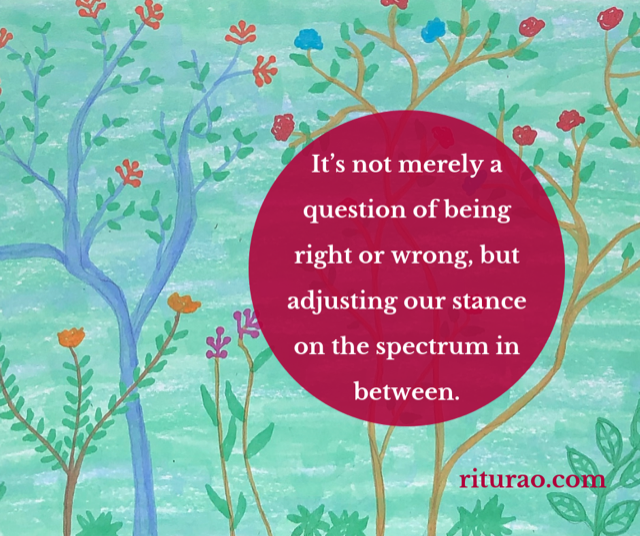
Discovering you’re wrong when you were sure you were right can be tough to take.
With my kids, admitting I was wrong feels the least uncomfortable, maybe because they’re still young and sweet and haven’t mastered the legendary teenage eyeroll-and-smirk combo.
In the outside world—with bosses, coworkers, ornery aunts, stubborn uncles and that grumpy guy in line at the grocery store—admitting a wrong, however slight, can get a little tricky, a little prickly.
But the hardest place to admit that what you believed in for a long while, maybe your entire life, is not as right as you thought, is inside yourself.
We often hear about the value of reflection, of responding, not reacting, of the space between stimulus and response that Victor Frankl famously said, the space where lies our power to choose our response.
Many people go so far as to conduct annual ‘reviews’ of their lives at the end of each year to evaluate what went well, what didn’t work.
Why take the trouble to reflect, pause, or review? To what end?
To calibrate.
To view the evidence of your own life, events and feedback, and make adjustments.
To modify rather than get paralyzed between making a this/that, black/white, default binary decision.
That is, if you want real change, for the better, the kind that lasts, not something that fizzles out in a week or two or six.
Easier said than done, which is why it helps to practice.
The space between right and wrong
Going from I’m right to I’m wrong is tough on our ego, our pride, our sense of self. The more solid our current beliefs, the harder they are to overturn.
And change feels like a threat. We’d rather dig our heels in on shaky ground than risk the unknown terrain of opposing ideas. It feels safer.
But it can also paralyze, and keep us stuck, because we’ve reduced our choice to one of two extremes; either right or wrong, euphoria or misery, ultimate success or utter failure.
Instead, when we’re faced with evidence that counters an inner belief—the truth of what happened, rather than what we wish happened, or glean new information—we can learn to take a step back.
We can learn to see it not as a threat but a reason to tweak or calibrate our current beliefs. This helps us be less judgemental of ourselves, because it’s not merely a question of being right or wrong, but adjusting our stance on the spectrum in between.
Calibrate your way forward
In the long run, when we do this enough, it becomes clear that it’s not “wrong” to consider evidence that contradicts what we believe, what we’ve always believed.
What hurt us more is missing opportunities to refine and improve our current beliefs and shift forward.
Changing our mind doesn’t have to be a betrayal of our sense of self; it can be an evolution to our better self.
Leave a Reply